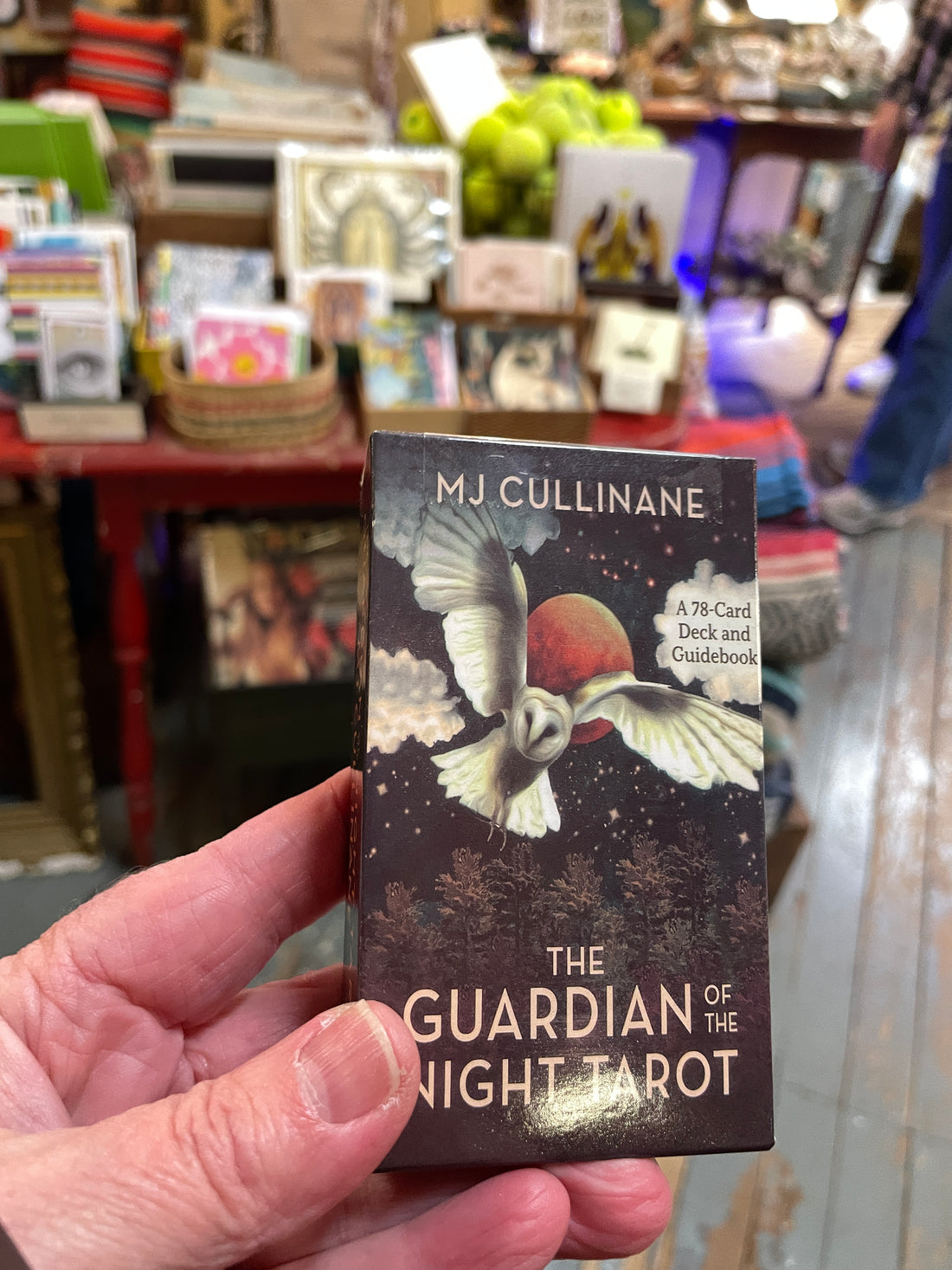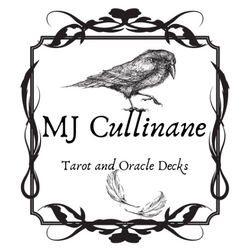
The Hidden Costs of Counterfeit Decks: A Personal Insight from a Tarot and Oracle Deck Creator
Share
The picture above is of a counterfeit copy of my Guardian of the Night deck. I found it on a table full of counterfeit decks at store here in Seattle. In this post I want to talk about indie publishing versus mass-produced decks and the problem with counterfeits.
As an independent artist and creator of Tarot and Oracle decks, I've navigated the challenging waters of indie publishing and mass production through a traditional publisher. Through my experience, I've realized that what might seem like a lucrative deal with traditional publishers often ends up being less beneficial for the artists. Here's why I've decided never to go through a traditional publisher again and why counterfeit decks pose a significant threat to creators.
The Illusion of Big Advances
Many assume that I must be reaping the financial benefits because my decks are widely available. Unfortunately, the reality is quite the opposite. So very much the opposite! And, as a single parent and sole provider, it is very stressful. Despite the visibility of my decks, like the Crow Tarot, Guardian of the Night, Urban Crow Oracle, Grimalkin's Curious Cats, and Forhaxa, the financial return is minimal. Let's break it down:
Suppose you receive an advance of $15,000 for your deck- this might sound like a considerable amount, but it's usually split into several payments spread across a year. Additionally, this money is taxed as income despite essentially being a loan against future sales you need to repay through the sales of your work.
The Realities of Royalties
Even if a publisher prints 20,000 units of your deck (which is a significant first order; the Crow Tarot only had 10,000 decks printed for its first mass-produced run) at around $0.60 per deck, that totals only $12,000—less than that $15,000 advance itself. Furthermore, publishers often reduce royalties through bulk sales or discounts to wholesalers, making paying back your advance and earning royalties even harder. This means you can go through two or three royalty payout cycles without seeing any additional income. Payout cycles tend to occur every six months. For example, although my Urban Crow Oracle and Grimalkin's Curious Cats have been mass-produced for about two years, I have yet to see any additional income other than the advance I have to pay back through sales and paid taxes on. (side note: If you are like me and spend months creating the deck and guidebook and all you receive is the initial advance that can equate to making well below minimum wage for your work). In addition some publishers retain a percentage of royalties owed for future product returns. Do you ever see that money? Who knows? I have yet to figure that out. Also, not every publisher is keen on audits. I hired a professional royalty auditor, and although I paid him $3,000 in the end, he was unable to get the company to provide the necessary information needed to do the audit. Here's the thing: these companies can do this knowing that the only way to get the information is to sue them, and as an artist, at least, I am in no financial position to do that, leaving the publishers able to do what they want with impunity.
The Darker Side of Counterfeit Decks
Counterfeit decks represent more than just a financial nuisance; they are a significant threat to the livelihoods of independent artists. When consumers opt for these cheaper knock-offs, they inadvertently support a shadow industry with ties to criminal networks.
How they really hurt the artist: Counterfeit decks directly compete with authentic ones, often at a lower price point. Many buyers, possibly unaware of their counterfeit nature, are attracted to the cheaper options. This not only diverts potential sales from the original artists and legitimate retailers but also dilutes the market, making it harder for genuine products to stand out. Every counterfeit purchase is a setback for artists who rely on deck sales to pay back their advances from publishers, It's already a challenge to cover the advance given the small royalties per deck, but with counterfeits in circulation, reaching the sales threshold needed becomes even more daunting. If the sales targets are unmet due to counterfeit purchases, publishers may see the deck as unprofitable and decide against further print runs. This leaves artists financially stranded, with the advance becoming a de facto ceiling on their earnings rather than a stepping stone. It is very possible for an artist to license their work to a publisher and never make any form of income from it due to paying back the advance and to add insult to injury, they can no longer produce the original work due to the licensing agreement.
Supporting Criminal Activity: Beyond the direct financial impact, buying counterfeit decks often supports broader criminal activities. The counterfeit market is typically run by networks that don't adhere to any regulations regarding labor rights or environmental standards. These operations may also be part of larger criminal enterprises that engage in other illegal activities, meaning that money spent on counterfeit goods could inadvertently support far more nefarious actions like human trafficking.
Long-term Damage to the Industry: The prevalence of counterfeits can erode trust in the marketplace, causing some customers to become skeptical of purchasing genuine decks if they've been burned by counterfeits in the past. These fake decks damage the overall market reputation and can deter new customers, further impacting legitimate artists and sellers.
As an artist and creator, witnessing the spread of counterfeit versions of my work is disheartening not only due to financial loss but also because it feels like a violation of my creative expression. My Wise Dog deck was available as a counterfeit deck before US Games even released it! I think it is important for people looking to buy a new tarot or oracle deck to be aware of the source of the products they buy and to understand the broader implications of purchasing counterfeits. By choosing to support original artwork, those interested in buying these "little collections of art" that serve as tarot and oracle decks help sustain the artists and the entire ecosystem of legitimate suppliers and retailers who rely on the authenticity of their products to thrive.
A Word of Caution
If you're an artist thinking about mass-producing your deck, it's important to consider the long-term implications. While it can be thrilling to see your creations in stores, the excitement can quickly fade when faced with the financial realities of traditional publishing and counterfeit products.
As I continue to create and share my decks, I do so with a commitment to my craft, engaging directly with my community and supporters. I encourage fellow artists to explore alternative publishing routes that align with their financial and creative goals.
I will say this: my decks, targeted by counterfeiters, have been mass-produced and printed in China. My indie decks are printed only in the USA. Other indie artists I talk with who have had their work ripped off have published their decks in China, which is probably the primary source.
Through sharing my story, I hope to shed light on the struggles independent artists face in a market flooded by counterfeits and dominated by large publishers. Our community, in so many ways, directly impacts an artist's ability to create the work it wants to see.

8 comments
Hi MJ,
I have shared this article in the description box below my video. https://youtube.com/live/Xd2rWPahnjk
This whole matter just sickens me.
Sadhana
As a regular ol’ consumer who wants to support indie artists, what should I do when I find a counterfeit deck? Let’s say I walk into a store here in Portland and I find a deck that I think is counterfeit. Who do I tell—you, the store manager, someone else? What information should I capture? If I’m going to take pictures with my phone, what pictures would be useful? Help us help you :)
Oh I didn’t know it was for a blog . I mostly wanted to shout out to MJ and co.
I love your artistry and the grounding that you have set for others ! my question is, would you say if it’s made in China then it is mass produced? Is that how we tell ,even though I have purchased two decks just from your indie publishing or your shop. Also I want you to check out the duo musicians MaMuse from Sebastopol California so wonderful. Also I took my daughter to see Sara Bareilles play at the Hollywood bowl with the Orchestra her first time. she is also grounded and from Eureka, California Amazing ! Full moon also ! Damm I did that ! Whee ! To you , a hug of support and girl power 🧚♀️
I love your artistry and the grounding that you have set for others ! my question is, would you say if it’s made in China then it is mass produced? Is that how we tell ,even though I have purchased two decks just from your indie publishing or your shop. Also I want you to check out the duo musicians MaMuse from Sebastopol California so wonderful. Also I took my daughter to see Sara Bareilles play at the Hollywood bowl with the Orchestra her first time. she is also grounded and from Eureka, California Amazing ! Full moon also ! Damm I did that ! Whee ! To you , a hug of support and girl power 🧚♀️